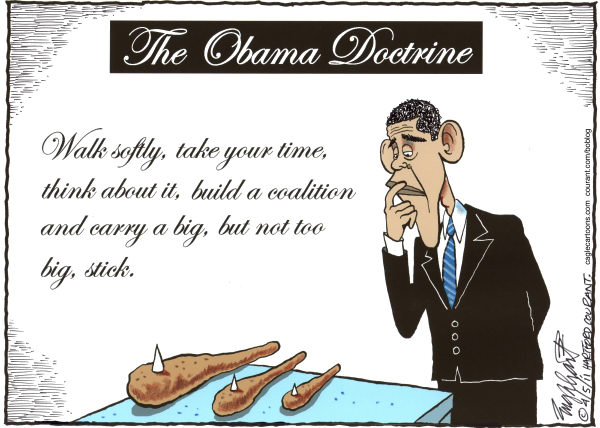The Obama Doctrine: Pretend to give a damn until you don’t have to.
An excellent analysis by Ben Shapiro:
For years, commentators have attempted to peg down just what the Obama Doctrine is. His allies have labeled the Obama Doctrine a form of realism about the limits of American power. His critics have labeled the Obama Doctrine “leading from behind.”
In 2009, President Obama came up with his own definition of an Obama Doctrine: “we’re only one nation… the problems that we confront, whether it’s drug cartels, climate change, terrorism, you name it, can’t be solved just by one country.” But Obama has also, at certain points, claimed to champion unilateralism in the service of human rights and internationalism in the service of diplomacy.
The Obama Doctrine has been difficult to pin down because there does not seem to be a common thread uniting his disparate policies – muscular interventionism in Libya, pushy paternalism with regard to Israel, eager abdication with regard to Syria and Ukraine.
But with Obama’s latest decision to launch airstrikes against the Islamic State in the Levant (ISIL or ISIS), the Obama Doctrine has now come into focus: pretend to give a damn about suffering of innocents when it hits the headlines, ignore it the rest of the time.
Because Obama doesn’t truly care. At all. He is a master emotional manipulator, capable of achieving effective posturing when it comes to the suffering of innocents. That’s why the media constantly swoon at his “tone” and his “attitude” during his press conferences. They repeatedly praise his “anger” or his “determination.” But they rarely ask just what he’s doing to fight evil.
Any deployment of power will be short-term and ineffective. Obama will do all he can for innocents up until the moment when he doesn’t have to do so. Then he’ll leave them to die.
That was certainly the case in Egypt, where Obama expressed extraordinary optimism about the ouster of Hosni Mubarak, then promptly allowed the Muslim Brotherhood to take over. He has since spent efforts attempting to undercut the Egyptian military, which launched a popularly-supported coup against Mohamed Morsi.
It has been the case in Iran, where Obama belatedly denounced the treatment of democracy protesters, then did nothing as they were shot in the streets.
It has been the case in Ukraine, where Vladimir Putin has annexed Crimea and invaded eastern Ukraine. Obama has expressed outrage; Putin has scoffed, and his rebel forces have shot down a passenger airliner, to approximately zero effective action from the West.
It has been the case in Nigeria, where after expressing upset over Boko Haram’s kidnapping of innocent girls and ensuring that the State Department endorse the “power of hashtag,” the Obama administration has done precisely nothing.
It has been the case in Syria, where Obama assured the world that should dictator Bashar Assad cross a red line with use of weapons of mass destruction, there would be consequences. There were none. Assad, who Obama said should go, just signed onto another seven-year term. In sum total, the number of dead in Syria now approaches 200,000.
Now, Obama has done the same in Iraq. He will drop a few bombs. He will bluster. Then the world’s attention will turn to some other crisis, and Obama will blithely move on, leaving erstwhile allies to die.
This is no groundbreaking revelation. President Obama has always cared far more about appearances than realities. He bobs like a cork on the waves of crisis, skipping to and fro, always carefully attuning his public emotions to achieve the most sympathetic effect. If brief shows of force are necessary, Obama is unafraid to engage in them. But he is unwilling to make any commitment to taking the lasting action that actually effects change. To do that, he would have to lead rather than follow.
He would have to care.
Barack Obama is an emotional pro and a foreign policy dilettante. And that is an extraordinarily dangerous combination. Popularity is the Obama Doctrine. Ironically, the end result is massive unpopularity – it turns out that world events require prolonged and sustained action rather than posturing. More importantly, the end result is massive casualties.

Sorry, the comment form is closed at this time.